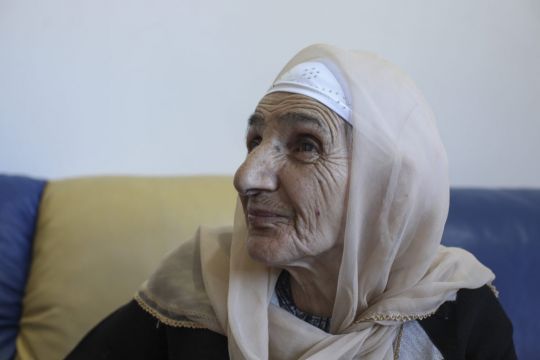For years, Zebulon Simentov branded himself as the “last Jew of Afghanistan.” He charged reporters for interviews and held court in Kabul’s only remaining synagogue. He left the country last month for Istanbul after the Taliban seized power.
Now it appears he was not the last one.
Simentov’s distant cousin, Tova Moradi, was born and raised in Kabul and lived there until last week. Fearing for their safety, Moradi, her children and nearly two dozen grandchildren fled the country in recent weeks in an escape orchestrated by an Israeli aid group, activists and prominent Jewish philanthropists.
“I loved my country, loved it very much, but had to leave because my children were in danger,” Moradi told The Associated Press from her modest quarters in the Albanian town of Golem, whose beachside resorts have been converted to makeshift homes for some 2,000 Afghan refugees.
Moradi, 83, was one of 10 children born to a Jewish family in Kabul. At the age of 16, she ran away from home and married a Muslim man. She never converted to Islam, maintained some Jewish traditions, and it was no secret that she was Jewish.
“She never denied her Judaism, she just got married in order to save her life as you cannot be safe as a young girl in Afghanistan,” her daughter, Khorshid, told the AP from her home in Canada, where she and three of her siblings moved after the Taliban first seized power in Afghanistan in the 1990s.
Despite friction over her decision to marry outside the faith, Moradi stayed in touch with some of her family over the years. Her parents and siblings fled Afghanistan in the 1960s and 1980s. Her parents are buried at Jerusalem’s Har Menuhot cemetery, and many of her surviving siblings and their descendants live in Israel.
But until this week, she had not spoken to some of her sisters in over half a century.
“Yesterday, I saw my sisters, nieces and nephews after around 60 years through a video call. We spoke for hours,” Moradi said. “I was really happy, I saw their children and they met mine.”
“They said ‘it’s like she came back from the grave,'” Khorshid said.
During the first period of Taliban rule, from 1996 until the 2001 US-led invasion, Moradi tried to maintain a low profile. But she risked her life by hiding Rabbi Isaak Levi, one of the few remaining Afghan Jews, from the Taliban.
Levi and Simentov lived together for years in the decrepit synagogue in Kabul but famously despised one another and fought often. The Taliban usually left them alone, but intervened during one such dispute, arresting them, beating them and confiscating the synagogue’s ancient Torah scroll.
IsraAid CEO Yotam Polizer said the organisation, which has provided relief after disasters such as the Japanese tsunami in 2011 and the Ebola outbreak in West Africa, had already extracted the Afghan women’s cycling team and dozens of other Afghans from the country when it heard about Moradi and her family.
He said Afghan diplomats overseas, Israeli President Isaac Herzog’s office, and Jewish businessmen. worked together to get them out.
Now, Moradi and six of her relatives are in Albania, and another 25 relatives made it to Abu Dhabi in the United Arab Emirates earlier this week. They hope to secure passage to Canada to reunite with her children who live there.







